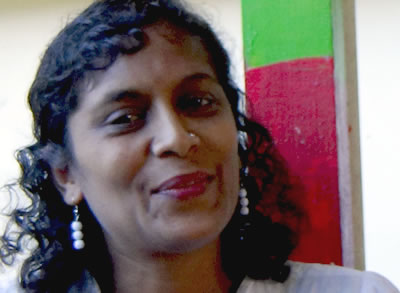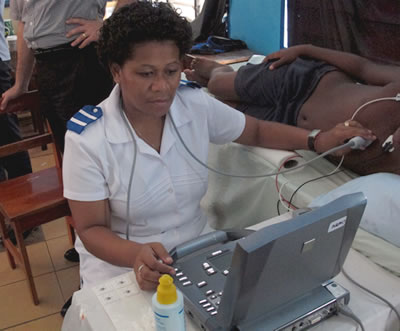|
WiRED’s Echo Training in Rheumatic Heart Disease Goes to the Field
BY ALLISON KOZICHAROW, EDITED BY BERNICE BORN
N

Mother in Fiji discussing her son's
treatment for RHD with nurses
urses and health workers can now apply knowledge and techniques learned from a series of training modules on the echocardiographic diagnosis of rheumatic heart disease (RHD). Echo screening for RHD is an important element in catching the disease early. With early detection, treatment can begin to head off a worsening condition and even death.
This echo training series—written by a three-member team of specialists and created as interactive training programs by WiRED—provides a tool to be used throughout regions of scarcity worldwide. Through thumb drives containing the modules or through Internet access, nurses and professional health workers can employ their knowledge to identify patients with possible RHD in underserved communities—where a visit from a cardiologist is unheard of.
Because of the increasing availability of portable ultrasound equipment, the timing for the echo program undertaking is perfect. Heretofore, training nurses and health professionals about RHD has been a lengthy process. WiRED’s echo training program educates its participants on the development and pathophysiology of RHD and on how to learn to acquire and interpret echocardiograms in the diagnosis of the condition. This will trim significantly any follow-up training required to qualify someone as an echo screener.

Here, using a special ultrasound machine, a nurse is
examining a child’s heart functions. The procedure is
painless and noninvasive and takes only 10 minutes.
These 10 minutes can help provide an RHD affected
child with many decades of life. The idea of the echo training began in 2012 at the World Congress of Cardiology in Dubai with a conversation between WiRED Director Gary Selnow, Ph.D., and Andrew Steers, M.D., a pediatrician and pediatric infectious diseases physician at the Royal Children’s Hospital in Melbourne, Australia. They discussed a project that would teach nurses and other first-line healthcare workers how to perform echocardiography to screen for RHD. WiRED had been working with Bo Remenyi, M.D., on a training series for physicians, and then Dr. Steers proposed a parallel curriculum for nurses.
Two years later, on May 5, 2014, the echo training modules for nurses were released at the World Congress of Cardiology held in Melbourne. The 10-part series, underwritten by Medtronic Philanthropy, was drafted by Dr. Steers, Daniel Engelman, M.D., of Royal Children’s Hospital, Melbourne, and Caroline Watson, M.D., of Royal Berkshire Hospital, Reading, U.K., who, along with Dr. Selnow, spoke at the session.
The launch of the echo training modules constitutes a significant addition to WiRED’s Community Health Education e-library. Dr. Selnow says: “You often read about today’s inequality of income, but you don’t often read about health knowledge inequality. No matter how we deliver the information, our goal at WiRED has always been the same: to address the severe global inequality of health knowledge. This echo training series contributes to that goal and, accordingly, it can have a huge impact on early detection of rheumatic heart disease.”
Authors of Echocardiographic Diagnosis
of Rheumatic Heart Disease
Daniel Engelman is a pediatrician at the Royal Children's Hospital, Melbourne, Australia, and a research fellow at the Centre for International Child Health, University of Melbourne.
Bo Remenyi is a pediatric cardiologist at the Royal Darwin Hospital and Northern Territory Cardiac Services, Australia, and a research fellow at the Menzies School of Health Research, Darwin, Australia.
Andrew Steer is a general pediatrician and pediatric infectious diseases physician at the Royal Children’s Hospital, Melbourne, Australia; senior research fellow at the Centre for International Child Health, University of Melbourne; and group leader of the Group A Streptococcal Research Group at the Murdoch Children’s Research Institute, Melbourne, Australia.
Caroline Watson is a senior house officer in general medicine at the Royal Berkshire Hospital, Reading, United Kingdom.
For additional information about rheumatic heart disease, see WiRED's training modules designed for students, teachers, and community health workers.
^ Back to the Top
|

